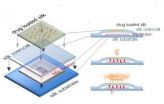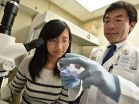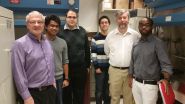(Press-News.org) Last year, University of Pennsylvania researchers Alexander J. Stewart and Joshua B. Plotkin published a mathematical explanation for why cooperation and generosity have evolved in nature. Using the classical game theory match-up known as the Prisoner's Dilemma, they found that generous strategies were the only ones that could persist and succeed in a multi-player, iterated version of the game over the long term.
But now they've come out with a somewhat less rosy view of evolution. With a new analysis of the Prisoner's Dilemma played in a large, evolving population, they found that adding more flexibility to the game can allow selfish strategies to be more successful. The work paints a dimmer but likely more realistic view of how cooperation and selfishness balance one another in nature.
"It's a somewhat depressing evolutionary outcome, but it makes intuitive sense," said Plotkin, a professor in Penn's Department of Biology in the School of Arts & Sciences, who coauthored the study with Stewart, a postdoctoral researcher in his lab. "We had a nice picture of how evolution can promote cooperation even amongst self-interested agents and indeed it sometimes can, but, when we allow mutations that change the nature of the game, there is a runaway evolutionary process, and suddenly defection becomes the more robust outcome."
Their study, which will appear in the Proceedings of the National Academy of Sciences, examines the outcomes of the Prisoner's Dilemma, a scenario used in the field of game theory to understand how individuals decide whether to cooperate or not. In the dilemma, if both players cooperate, they both receive a payoff. If one cooperates and the other does not, the cooperating player receives the smallest possible payoff, and the defecting player the largest. If both players do not cooperate, they both receive a payoff, but it is less than what they would gain if both had cooperated. In other words, it pays to cooperate, but it can pay even more to be selfish.
Stewart and Plotkin's previous study examined an iterated and evolutionary version of the Prisoner's Dilemma, in which a population of players matches up against one another repeatedly. The most successful players "reproduce" more and pass along their winning strategies to the next generation. The researchers found that, in such a scenario, cooperative and even forgiving strategies won out, in part because "cheaters" couldn't win against themselves.
In the new investigation, Stewart and Plotkin added a new twist. Now, not only could players alter their strategy -- whether or not they cooperate -- but they could also vary the payoffs they receive for cooperating.
This, Plotkin said, may more accurately reflect the balancing of risk and reward that occurs in nature, where organisms decide not only how often they cooperate but also the extent to which they cooperate.
Initially, as in their earlier study, cooperative strategies found success.
"But when cooperative strategies predominate, payoffs will rise as well," Stewart said. "With higher and higher payoffs at stake, the temptation to defect also rises. In a sense the cooperators are paving the way for their own demise."
Indeed, Stewart and Plotkin found that the population of players reached a tipping point after which defection was the predominant strategy in the population.
In a second analysis, they allowed the payoffs to vary outside the order set by the Prisoner's Dilemma. Instead of unilateral defection winning the greatest reward, for example, it could be that mutual cooperation reaped the greatest payoff, the situation described by a game known as Stag Hunt. Or, mutual defection could generate the lowest possible reward, as described by the game theory model known as the Snowdrift or Hawk-Dove game.
What they found was that, again, there was an initial collapse in cooperative strategies. But, as the population continued to play and evolve, players also altered the payoffs so that they were playing a different game, either Snowdrift or Stag Hunt.
"So we see complicated dynamics when we allow the full range of payoffs to evolve," Plotkin said. "One of the interesting results is that the Prisoner's Dilemma game itself is unstable and is replaced by other games. It is as if evolution would like to avoid the dilemma altogether."
Stewart and Plotkin say their new conception of how strategies and payoffs co-evolve in populations is ripe for testing, with the marine bacteria Vibrionaceae as a potential model. In these bacterial populations, the researchers noted, individuals cooperate by sharing a protein they extrude that allows them to metabolize iron. But the bacteria can possess mutations that alter whether they produce the protein and how much they generate, whether and how much they cooperate, as well as mutations that affect how efficiently they can take up the protein, their payoff. The Penn researchers said a "natural experiment" using these or other microbes could put their theory to the test, to see exactly when and how selfishness can pay off.
"After this study, we end up with a less sunny view of the evolution of cooperation," Stewart said. "But it rings true that it's not the case that evolution always tends towards happily ever after."
INFORMATION:
The study received support from the Burroughs Wellcome Fund, David and Lucile Packard Foundation, U.S. Department of the Interior, U.S. Army Research Office and the Foundational Questions in Evolutionary Biology Fund.
MEDFORD/SOMERVILLE, Mass. (Nov. 24, 2014, 3 P.M.) -- Researchers at Tufts University, in collaboration with a team at the University of Illinois at Champaign-Urbana, have demonstrated a resorbable electronic implant that eliminated bacterial infection in mice by delivering heat to infected tissue when triggered by a remote wireless signal. The silk and magnesium devices then harmlessly dissolved in the test animals. The technique had previously been demonstrated only in vitro. The research is published online in the Proceedings of the National Academy of Sciences Early ...
A Jackson Laboratory research team has found that the misfolded proteins implicated in several cardiac diseases could be the result not of a mutated gene, but of mistranslations during the "editing" process of protein synthesis.
In 2006 the laboratory JAX Professor and Howard Hughes Medical Investigator Susan Ackerman, Ph.D., showed that the movement disorders in a mouse model with a mutation called sti (for "sticky," referring to the appearance of the animal's fur) were due to malformed proteins resulting from the incorporation of the wrong amino acids into proteins ...
Research that provides a new understanding of how bacterial toxins target human cells is set to have major implications for the development of novel drugs and treatment strategies.
Cholesterol-dependent cytolysins (CDCs) are toxins produced by major bacterial pathogens, most notably Streptococcus pneumoniae and group A streptococci, which collectively kill millions of people each year.
The toxins were thought to work by interacting with cholesterol in target cell membranes, forming pores that bring about cell death.
Published today in the prestigious journal Proceedings ...
A commonly prescribed muscle relaxant may be an effective treatment for a rare but devastating form of diabetes, researchers at Washington University School of Medicine in St. Louis report.
The drug, dantrolene, prevents the destruction of insulin-producing beta cells both in animal models of Wolfram syndrome and in cell models derived from patients who have the illness.
Results are published Nov. 24 in the Proceedings of the National Academy of Sciences (PNAS) Online Early Edition.
Patients with Wolfram syndrome typically develop type 1 diabetes as very young children ...
(Edmonton) A team of researchers from the University of Alberta has discovered a new approach to fighting breast and thyroid cancers by targeting an enzyme they say is the culprit for the "vicious cycle" of tumour growth, spread and resistance to treatment.
A team led by University of Alberta biochemistry professor David Brindley found that inhibiting the activity of an enzyme called autotaxin decreases early tumour growth in the breast by up to 70 per cent. It also cuts the spread of the tumour to other parts of the body (metastasis) by a similar margin. Autotaxin is ...
High blood pressure and nonalcoholic fatty liver disease (NAFLD) are two emerging health problems related to the epidemic of childhood obesity. In a recent study, researchers at University of California, San Diego School of Medicine sought to determine the prevalence of high blood pressure in children with NAFLD, which places them at risk for premature cardiovascular disease.
The study, published in the November 24 edition of PLOS ONE, found that children with NAFLD are at substantial risk for high blood pressure, which is commonly undiagnosed.
"As a result of our ...
PRINCETON, N.J.--A team led by researchers from Princeton University, Michigan State University and the Indonesian Institute of Sciences have confirmed the discovery of a new bird species more than 15 years after the elusive animal was first seen on the Indonesian island of Sulawesi.
The newly named Sulawesi streaked flycatcher (Muscicapa sodhii), distinguished by its mottled throat and short wings, was found in the forested lowlands of Sulawesi where it had last been observed. The researchers report in PLOS ONE that the new species is markedly different from other flycatchers ...
November 24, 2014 - Differences in breast size have a significant mental health impact in adolescent girls, affecting self-esteem, emotional well-being, and social functioning, reports the December issue of Plastic and Reconstructive Surgery®, the official medical journal of the American Society of Plastic Surgeons (ASPS).
More than just a "cosmetic issue," breast asymmetry can have negative psychological and emotional effects, according to the study by ASPS Member Surgeon Dr. Brian I. Labow and colleagues of Boston Children's Hospital. They suggest that early intervention ...
November 24, 2014 - For women considering breast reduction surgery, initial evaluation at a shared medical appointment (SMA) provides excellent patient satisfaction in a more efficient clinic visit, reports a study in the December issue of Plastic and Reconstructive Surgery®, the official medical journal of the American Society of Plastic Surgeons (ASPS).
Shared medical appointments have additional benefits, including "group learning, peer support, and a sense of solidarity and commonality" among women learning about breast reduction surgery, according to the study ...
Climate change could lengthen the growing season, make soil drier and decrease winter snowpack in the Lake Michigan Basin by the turn of the century, among other hydrological effects.
A new U.S. Geological Survey precipitation and runoff model shows that by 2100, maximum daily temperature in the Lake Michigan Basin could increase by as much as seven degrees Fahrenheit, and the minimum daily temperature by as much as eight degrees. A new USGS report published today summarizes the potential hydrological effects of these increases on the basin through 2099. The tools can ...



